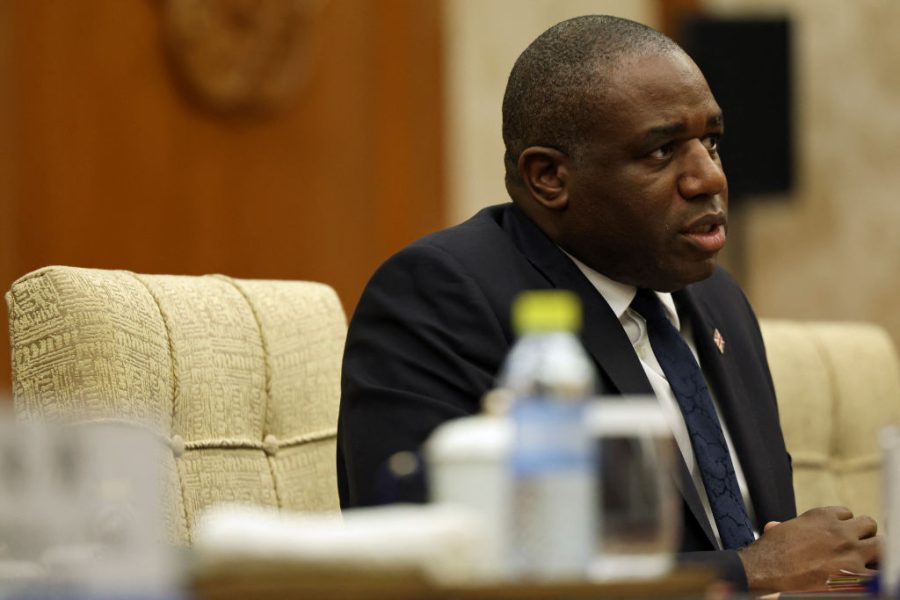Normally when MPs criticise the uncertainty around the government’s relationship with another country, they are referring to the constant chopping and changing around how to engage with China, not Israel. But where the UK stands on both countries is in flux at the moment, and today’s Foreign Office Questions in the Commons didn’t help much either.
Priti Patel, who is now the shadow foreign secretary, used China as her main line of attack at topical questions, claiming that the current iteration of relations ‘appears to be all give and no take’. She asked the Foreign Secretary David Lammy to explain ‘what has been achieved with regard to advancing Britain’s interests in respect of security, economic practices and human rights since his recent visits to China, and what he expects to be achieved during his future visits?’
Lammy wasted no time in mocking the Conservatives, pointing out that ‘under the last government there were about seven different China policies and very little was achieved’. Either he was being unduly kind to the Tories over their 14 years of China policy, or he was only referring to the Rishi Sunak era, which had about seven different China policies all of its own. He added: ‘We have had four and a half months. I was very pleased to be in China discussing issues on which we disagree, on which we agree and on which we challenge China, and I will continue to do that over the coming months and years.’
Patel then asked whether the government had called for the repeal of Hong Kong’s national security law and for Jimmy Lai to be released. On the latter, she demanded that ‘he will ensure that no deals – such as China’s application for a new embassy – can go ahead until Jimmy Lai is free?’ Lammy’s response was merely that ‘of course we have raised issues relating to Jimmy Lai… and the security law in Hong Kong’.
Earlier in the session, Patel had raised the plight of the Israeli hostages still being held by Hamas after the 7 October atrocities. The majority of the questions relating to Israel from across the House, though, were about the war in Gaza and Israeli settler violence. Labour backbencher Rosena Allin-Khan demanded ministers confirm that they were ‘considering appropriate action’ against Benjamin Netanyahu and former defence minister Yoav Gallant following the International Criminal Court’s decision to issue arrest warrants against them. Foreign office Minister Hamish Falconer replied: ‘I can assure my honourable Friend the Member for Tooting that the UK government intend to stand by our international obligations in relation to the ICC, and in relation to many other things, too.’
In other answers, Falconer repeatedly said that the government took its obligations under international law very seriously, though didn’t set out any further mechanics. Similarly, Anneliese Dodds told a number of MPs that the government was committed to following international law.
This assertion would normally sound quite anodyne. But it is a key part of understanding how the UK government has got into the position it has: having to set out, as it did in the Commons yesterday and today, what the process would be for implementing an arrest warrant against the leader of a country which ministers still insist they back as it defends itself and tries to recover its hostages.
Keir Starmer and his colleagues were personally quite disgusted by the way the Conservatives were prepared to breach international law and undermine international institutions. They have made correcting that behaviour a priority in government. The problem with this correction, though, is that it risks becoming an overcorrection which ultimately undermines the efforts to bring the conflict to a close by further alienating Netanyahu – and the incoming US President Trump.
Emily Thornberry, chair of the foreign affairs committee, was one of a number of MPs who raised illegal settlements and violence in the West Bank. She referred to former foreign secretary David Cameron’s claim that before the last general election, the Foreign Office ‘was working up potential sanctions against those two most controversial and infamous settlers’, Israeli national security minister Itamar Ben-Gvir and finance minister Bezalel Smotrich.
Lammy objected to this, saying: ‘I think the previous foreign secretary was wrong to talk about sanctions under consideration – particularly to talk about sanctions that he said were under consideration but then did not implement.’ He said he would not be drawn on sanctions policy at the dispatch box, but ‘anyone looking can see the strength of feeling in the House’. That strength of feeling has, for some time, been more against Israel than for it, and the government is following that.








Comments